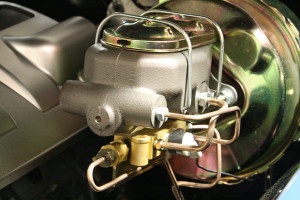Recently, we wrote about converting manual to power brakes whether your car originally came from the factory with drum or disc brakes. We received several follow up questions from people with drum brakes looking to upgrade to better braking – but trying hard to stay on a budget.
Since the hardware at the wheels and brake lines can remain untouched after converting to a power assisted pedal, we were asked, “Can I just add a booster and new master cylinder to my car?” Essentially the questioners were asking whether the booster master conversion kit or the complete brake conversion kit was their best solution. Of course, like the answer to a lot of questions, it depends!
The reason we created and sell a complete conversion kit for drum to disc brakes is the superior stopping power that disc brakes provide as well as the ease and reliability of having all of the parts you will need in one single kit. We covered the REAL difference between disc and drum brakes a while back in a TechTalk article describing the difference in heat buildup between disc and drum brakes. (Fascinating stuff if you didn’t catch it!)
But to make it easier to apply the brakes – drum or disk – we also developed a series of brake booster kits that are sized correctly to be make, model and year specific. So, if your goal in improving your braking is making the brakes easier to operate – using less leg power – our power brake booster kits may be ideal. In many cases, it is possible to add power assist to your current manual brake setup by simply unbolting the master cylinder from the firewall and inserting an appropriately sized power booster and master cylinder. Provided your brake lines are long enough, you might not have to remove the lines to do this.
Cautionary note here – some back yard mechanics would claim that you don’t have to bleed the brakes afterwards if you didn’t disconnect the brake lines.
We, on the other hand at Master Power Brakes, being sticklers for safety, would insist that you SHOULD STILL BLEED THE BRAKES.
Some installations simply require repositioning the brake pedal attachment. Other vehicles may require even less modification because the change in ratio is handled through a bellcrank assembly built into the booster mounting brackets.
In the scenarios mentioned above, you would either be disconnecting the brake pedal pushrod from the brake pedal and then reattaching the new pushrod from the new booster/master combo. In the other scenario, you may have to drill a new hole and relocate the pushrod to a lower hole on the pedal. This is all done in an effort to maintain the proper brake pedal ratio as we talked about in September 2015.
Occasionally, we hear about an individual who has installed power brakes on an originally manual brake car and now the brakes are extremely sensitive. This can very easily be caused by using the incorrect booster. As you’ve read before, you simply can’t put enough booster on a car equipped with disc brakes but on a drum brake-equipped car, it is possible to over-assist the brakes and cause that touchy or sensitive pedal. If you are unsure, give us a call. We’ll gladly walk you through the process.
 Upgrading to a dual reservoir master cylinder should be the top-of-the-list first upgrade you ever make if your car is equipped with a single reservoir master cylinder. Back before the 1970’s most of the auto manufacturers used a single reservoir master cylinder. Let’s lay out the mechanical problem that presented – and is still in play if you are driving with a single reservoir master.
Upgrading to a dual reservoir master cylinder should be the top-of-the-list first upgrade you ever make if your car is equipped with a single reservoir master cylinder. Back before the 1970’s most of the auto manufacturers used a single reservoir master cylinder. Let’s lay out the mechanical problem that presented – and is still in play if you are driving with a single reservoir master.
If a master cylinder should fail and there is only one reservoir and a single brake line, you will effectively lose brakes on the entire vehicle. A dual reservoir master cylinder gives you the security of a separate, secondary stopping system if one reservoir springs a leak or otherwise fails.
For this reason our power brake booster kits and complete drum to disc conversion kits supply a master cylinder with two reservoir chambers whether your car came with a single or dual reservoir master cylinder to begin with.
Need some solid brake component advice for your classic car? Call 1-800-472-4181 or get a hold of us here and we will be happy to help you out.

